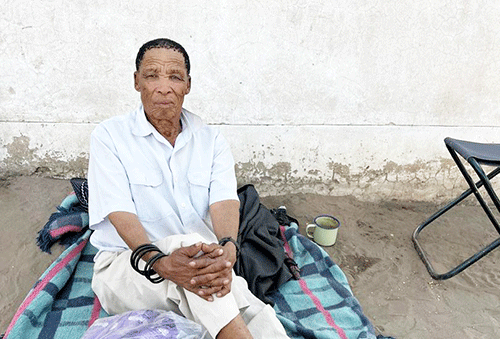Limba Mupetami
Leon Tsamkgao, the son of Tsamkxao #Oma Bobo, chief of the Ju/‘hoan Traditional Authority, has expressed serious concerns regarding the Nyae Nyae conservancy’s modus operandi in Tsumkwe.
He claims rampant exploitation
of the marginalised community,
land grabbing, overgrazing and
non-members accessing resources, which has been going on for years, as thorns in their flesh.
In an exclusive interview with this publication, Tsamkgao, who is
next in line for the chieftaincy,
said powerful individuals have established shebeens in the area, where pensioners particularly struggle to use their money productively due to the tight control of local shebeen owners.
Tsamkgao, in the company of his father, emphasised the community’s dire need for government intervention to address the severe alcohol abuse problem among pensioners, exacerbated by the proliferation of shebeens.
Tsamkgao pointed out that both young and old San people are often paid with alcohol as barter for their hard work, which further deteriorates the community’s already fragile conditions.
He detailed how shebeen owners allegedly primarily target pensioners, as they are among the few who receive money monthly. These pensioners are “forced” to take food items and alcohol on credit, leading to a cycle of debt and exploitation.
He also accused shebeen owners of holding national documents of the people, and accompanying them on payday to seize their money, forcing the elderly back into debt as they take more on credit.
Addressing the issue of education, Tsamkgao lamented the high dropout rates of San children. He noted a drastic change from his school days, where only a few students failed out of a classroom of 30, to the present, where the majority fail. He attributed this to children spending time in shebeens, drinking alongside their teachers. He accused the teachers of disrespecting
parents, and contributing to the problem by sending children to buy cigarettes and beer.
Tsamkgao also raised concerns about agricultural projects being handed over to non-San people. He stated “During meetings, San individuals are excluded from discussions and projects, only
being hired as labourers to plough, clean and take care of livestock for others”.
He said the veterinary fence between Gam and Tsumkwe has been cut, “allowing people to move in with their cattle to graze illegally”. He observed that while a San person might own only three cattle, the rest belong to other tribes, grazing illegally in the area.
Drugs
Moreover, according to him, drugs are being sold to the San youth, exacerbating the community’s struggles, despite the police’s efforts to address these issues.
Tsamkgao criticised the distribution of the drought relief food, also known as ‘Harambee food’ by some. He accused development planners from Otjiwarongo and Windhoek of refusing to cooperate with the traditional authority, registering people who are not in need of these food items which include maize meal, cooking oil, occasional soup and sugar, and removing legitimate recipients from the list.
He emphasised the inconsistency in food distribution, noting that sometimes three months pass before the food arrives, and even when food arrives, only a few receive it.
“We are really suffering in this conservancy, and we need help to fix all these problems,” said Tsamkgao.
Contacted for comment, the Ministry of Environment,
Forestry and Tourism’s public relations officer Romeo Muyunda said issues such as overgrazing and a fence being cut should be answered by the ministry of agriculture.
-lmupetami@nepc.com.na


